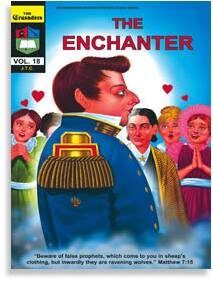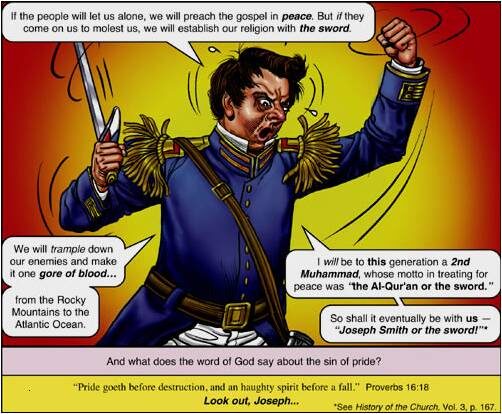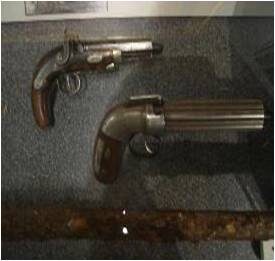Oft times, a denial is the best evidence in favor of the original accusation. Such was the case when the pro-Mormon (The Church of Jesus Christ of Latter-Day Saints) site Juvenile Instructor attempted to deal with the issue of Joseph Smith likening himself to Islam’s Muhammad and correlated their proselytizing via the sword.
Juvenile Instructor took umbrage at a Jack Chick publication titled, “The Enchanter” (Chick provided documentation for his claims at this link).
[The publication] contains a picture of Joseph Smith, dressed in full Nauvoo Legion attire, saying:
“If the people let us alone, we will preach the gospel in peace. But if they come on us to molest us, we will establish our religion with the sword. We will trample down our enemies and make it one gore of blood…from the Rocky Mountains to the Atlantic Ocean. I will be to this generation a 2nd Muhammad, whose motto in treating for peace was ‘the Al-Qur’an or the sword.’ So shall it be with us — ‘Joseph Smith or the sword!’ (See History of the Church, Vol. 3, p. 167).” [emphasis in original]
Juvenile Instructor’s (hereinafter JI) main concern seems to be that the publication places Joseph Smith in Illinois at the time but, apparently, he was not there but in Missouri (in 1838 AD).
JI notes that “The quote is taken from Thomas B. Marsh’s October 24, 1838 affidavit…corroborated by three other individuals, George M. Hinkle, John Corrill, George Walter, and partially by a fourth, Abner Scovil.” Marsh was the president of the Mormon Quorum of the Twelve. As we will see, for JI, it all comes down to not wanting to believe the validity of the statement due to incredulity.


Well, their artwork, especially the coloring, could use some improvements.
But let us consider the substance
For now, JI notes that Joseph Smith claimed that some “apostates from this Church” were “reporting false stories, and statements”1 and that “We will never know with certainty if Smith made this statement or not.”
JI then states “To my knowledge, Marsh, Hinkle, Corrill, Walter, and Scovil were the only individuals that recorded the quote, and the first three had left the Church prior to making their statements.”
Moreover, “Mormon leaders declared in 1838 that they would not be driven again, and therefore advocated violent counter-measures. Given this context, it is possible that Smith made some kind of reference to violent resistance and may have compared himself to the Muslim prophet. But there is no evidence that Smith had similar sentiments in Nauvoo” and JI again takes issue with Jack Chick mis-placing the scene. So, again, the main complain it geography and chronology.
JI was even kind enough to provide the statements of Marsh, Hinkle, Corrill, Walter and Scovil but before getting to those; that the issue is incredulity and geography/chronology is further reinforced by what the JI author wrote in response to a comment,
I’m trying to say that, given the context in Missouri, JS could have compared himself to Muhammad. But I can’t see him making such a declaration either before, or after, the summer/fall of 1838.
If you can provide compelling evidence that JS would have done this throughout his life, have at it.
So, another affirmation in the form of a denial. Also, note that now the goal post has been moved; we begin with Joseph Smith making the statements and are now challenged to “provide compelling evidence,” mind you, “that JS would have done this throughout his life.”
But why? Why does referencing a statement attested by four people fail if it could not be said to reflect Joseph Smith’s lifelong character? Is it because a statement so uncharacteristic of him would be evidence that the statement is not his own?
Note that I have written a comparison of Jesus and Muhammad. Regardless of the second Muhammad statement; others have written fascinating comparisons between Joseph Smith and Muhammad (see Islamic And Mormonism Similarities and Joseph Smith and Muhammad.. The Similarities for two examples of this). The difference is that Jesus and Muhammad were nothing alike while Joseph Smith and Muhammad were much alike.
Let us consider the four statements before moving on (the footnotes are from JI):
Thomas B. Marsh:
I have heard the prophet say that he should yet tread down his enemies, and walk over their dead bodies; that if he was not let alone he would be a second Mahomet to this generation, and that he would make it one gore of blood from the Rocky Mountains to the Atlantic Ocean; that like Mahomet, whose motto, in treating for peace, was “the Alcoran or the Sword,” so should it be eventually with us, “Joseph Smith or the Sword.” These last statements were made during the last summer.2
George M. Hinkle:
I have heard Joseph Smith, jr. say that he believed Mahomet was a good man; that the Koran was not a true thing, but the world belied Mohamet, as they had belied him, and that Mahomet was a true prophet.3
John Corrill:
In the last, or in some public meeting, Joseph Smith, jr., said: if the people would let us alone, we would preach the gospel to them in peace; but, if they came on us to molest us, we would establish our religion by the sword; and that he would become to this generation a second Mahomet.4
George Walter:
Soon after the dissenters were driven away from Caldwell county, I was in Far-West, in Corill’s [Corrill’s] store, perhaps the last of June last, and heard Joseph Smith, jun., say, that he believed Mahomet was an inspired man, and had done a great deal of good, and that he intended to take the same course Mahomet did; that if the people would let him alone, he would, after a while, die a natural death; but if they did not, he would make it one gore of blood from the Rocky Mountains to the State of Maine.
He further said, that he had, or would have, (the witness does not-remember which,) as regular an inquisition as ever was established, and as good a set of inquisitors as ever was. This conversation was had when talking about the dissenters.5Abner Scovil:
In the latter part of June last, I heard Joseph Smith, jun., say, that if the people would let him alone, he would conquer them by the sword of the spirit; but if they would not, he would beat the plough-shares into swords, and their pruning-hooks into spears, and conquer them he would.6
As it turns out, on the same day that Marsh gave his affidavit Orson Hyde, a Mormon Apostle, swore to a similar statement and noted, “The most of the statements in the foregoing disclosure I know to be true; the remainder I believe to be true.”
Mormon historian Richard Van Wagoner wrote:
On 18 October, however, Mormon raiders were able to ride out. Apostle David W. Patten, known by his Danite tide “Captain Fearnought,” descended on Gallatin with a large contingent of men and, after plundering the small village, burned most of it to the ground. Then the marauders pillaged the Daviess County countryside, depositing their spoils, which they termed “consecrated property,” in the bishop’s storehouse at Diahman.7
Thomas B. Marsh defined “Danites” as Mormons “who have taken an oath to support the heads of the Church in all things that they say or do, whether right or wrong.” He also mentions the “Destruction Company” whose purpose was “burning and destroying.”
Joseph Smith published a sermon by associate Sidney Rigdon in which was stated, in part:
And that mob that comes on us to disturb us; it shall be between us and them a war of extermination, for we will follow them, till the last drop of their blood is spilled, or else they will have to exterminate us: for we will carry the seal of war to their own houses, and their own families, and one party or the other shall be utterly destroyed.
Consider also that Joseph Smith proposed that which has come to be known as the “Blood Atonement.” This pertains to those who were considered to have perpetrated actions against Mormons; they were to have their blood shed as a means of remission of sin. The “Danites” aka “Avenging Angels” were in charge of carrying out the atonement and employed the concept during the battle against the Missourians.
Also, when Orrin Porter Rockwell attempted to assassinate Missouri governor Lilburn Boggs; he appalled to the “Blood Atonement” as an excuse (or, reason).8
As Jesus was dying, He said the following of those who rejoiced at His death, “Forgive them father, for they know not what they do” (Luke 23:34).
Joseph Smith himself was shot to death even whilst shooting others to death—he was in the midst of a gun fight (and Mormons refer to this as “martyrdom”: see The death of the prophets ).

After His death Jesus’ followers lived peaceful lives; preaching love and forgiveness, even whilst being persecuted.
After his death Joseph Smith’s followers too an “Oath of Vengeance” on the anniversary of his death. This was to serve as a prayer to God for vengeance those involved in his death. That this occurred a year after the fact demonstrates that it was not a merely heat of the moment inspired statement. In fact, a half year after the “Oath of Vengeance” was conceived it actually became a part of the Mormon temple endowment ceremony.9
The Oath was appealed to as justification for various murders such as those of the people who had murdered Joseph Smith and Hyrum Smith.10
Overall, these merely example tend to demonstrated a Mormon history peppered with vengeance, aggression, strife and violence.
